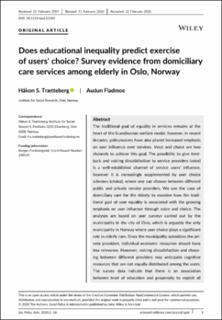Does educational inequality predict exercise of users' choice? Survey evidence from domiciliary care services among elderly in Oslo, Norway
Peer reviewed, Journal article
Published version
Permanent lenke
https://hdl.handle.net/11250/2647571Utgivelsesdato
2020Metadata
Vis full innførselSamlinger
Originalversjon
https://doi.org/10.1111/spol.12589Sammendrag
The traditional goal of equality in services remains at the heart of the Scandinavian welfare model; however, in recent decades, policymakers have also placed increased emphasis on user influence over services. Voice and choice are two channels to achieve this goal. The possibility to give feedback and voicing dissatisfaction to service providers (voice) is a well‐established channel of service users' influence, however it is increasingly supplemented by user choice schemes (choice), where one can choose between different public and private service providers. We use the case of domiciliary care for the elderly to examine how the traditional goal of user equality is associated with the growing emphasis on user influence through voice and choice. The analyses are based on user surveys carried out by the municipality in the city of Oslo, which is arguably the only municipality in Norway where user choice plays a significant role in elderly care. Since the municipality subsidizes the private providers, individual economic resources should have less relevance. However, voicing dissatisfaction and choosing between different providers may anticipate cognitive resources that are not equally distributed among the users. The survey data indicate that there is an association between level of education and propensity to exploit all channels of user influence. Expanding user influence by introducing user choice thus confirms the differences between highly educated and less educated.
